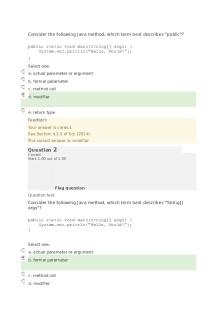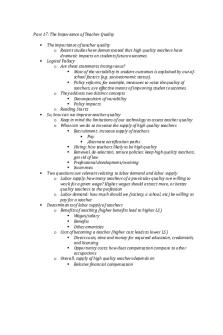Consider the qualities of an inspirational teacher PDF

| Title | Consider the qualities of an inspirational teacher |
|---|---|
| Course | Primary Education |
| Institution | Canterbury Christ Church University |
| Pages | 3 |
| File Size | 40.6 KB |
| File Type | |
| Total Downloads | 99 |
| Total Views | 181 |
Summary
Looking into the qualities of an inspirational teacher....
Description
Consider the qualities of an inspirational teacher. Discuss, in your view, what makes a teacher inspirational and consider whether the Teachers' Standards (DfE, 2012), constrain or promote inspirational practice. As well as referring to the Teachers' Standards, consider your response with reference to current literature and your own school practice. The word inspiration has been defined by Oxford dictionary s the process of being mentally stimulated to do or feel something. Many individuals such as Day’s believe that some teachers have qualities, which makes them an inspirational teacher such as their characteristics or the passion for the job. All teachers in the UK have to follow a set of teaching standards, which outline the set of qualities a teacher should uphold. Some individuals believe the teaching standards constrain the teacher’s ability to be an inspirational teacher. In the following essay, I am going to use my personal school experience and current literature to argue that the Teaching Standards do in fact promote teachers inspirational quality. There are wide ranges of ways in which a teacher can be seen to be inspiring. Days (2004) argues that ‘passion in teaching is not a luxury or frill, but is essential to all good practice’. Most inspirational teachers are not content with just teaching the curriculum and the beaucracy of governments needs. Most understand their pupils and teach with passion for their class and what they are teaching. Therefore the passion a teacher puts into their lesson helps them to become inspirational as well as making it more likely to create inspirational lessons. In the Teaching Standards, section 1, it clearly states that a teacher should set high expectations, which inspire, motivate and challenge their pupils. Therefore, teachers themselves through their attitude to learning and their personal characteristics can inspire and challenge pupils, which can be done through setting high expectations. Teachers have been identified as being at the heart of children’s learning and thus are responsible for their pupil’s success. The teaching standards highlights that a teacher should set goals that challenge and inspire pupils of all backgrounds, abilities and dispositions. This highlights the fact, if a teacher were to uphold a negative attitude and set low expectations for pupils; this could lead to a self-fulfilling prophecy. Therefore a teacher’s attitude and their characteristics can inspire children to do better. John Ruskin suggested that ‘teaching is painful, continual and difficult work; to be done by kindness, by watching, by warning, by perception and by praise, but above all by example’. To the children, teachers are seen to be role models and so they must set a good example in order to inspire to be what the teacher is like. Within placement, this has been highlighted through charity giving before Christmas. The teacher set an example by giving money to charity and the pupils followed her example, as they were inspired to do so. Yet the view on what makes a teacher inspiring has usually been explored by educational research, which is usually through the eyes of an adult. In addition to this, most educational research looks into behaviour or the content in the lesson
rather than whether a teacher is inspirational. A survey was produced which highlighted what pupils through created an inspiring teacher. It suggested a teacher, which encourages and motivates pupils, inspired them to do well. Yet a teacher who is overbearing and makes the class sit in silence is uninspiring. Furthermore, the way a classroom is set up can either inspire or uninspired pupils. Therefore, if a teacher were to have all of these qualities, they could be seen to be an inspiring teacher. All teachers in the UK follow a set of teaching standards which outline their responsibilities for the children in their class. Yet, it has been argued that the teaching standards constrain inspirational practice. Teaching standards such as ‘know and understand how to assess the relevant subject and curriculum areas, incusing statutory assessment requirements’, focuses on the beauracy of teaching rather than how to develop the child as a whole person. The amount of work that teachers have drains them and thus makes them more likely to follow past lesson plans, which may be out-dated, and thus uninspiring. In addition to this, ‘including statutory requirements’ also leads to uninspiring teachers. From personal observation in the classroom, it can be suggested that children are uninspired. Assessments leave little space for individual input and thus makes it harder to inspire. Therefore, it could be suggested that the teaching standards constrains inspirational teaching. Constraints for inspirational teachers can also be shown in other areas of the teaching standards such as ‘impart knowledge and develop understanding through effective use of lesson time’. This focuses on how to use lesson time effectively rather than how to be an inspirational teacher. In addition to this, the focus on ‘impart knowledge’ seems to suggest skinners behaviourist theory and rote learning. Although rote learning helps children remember information such as numbers within a French lesson, in my opinion, it is not an inspiring teaching method as it does not motivate children. Yet, there are also many ways in which the Teaching Standards promotes inspirational teaching. In the Teaching Standards, it clearly states that a teacher should ‘promote a love of learning and children’s intellectual curiosity’. This highlights that teachers should inspire pupils to go further into learning and encourages pupils to be curious of their intellectual learning. It promotes a love for learning and if it is done, it will set pupils up to do well in academic life and enjoy education. It highlights an inspirational practice as only an inspirational teacher will create a love for learning as a child will enjoy their lesson. Therefore, this suggests that the Teaching Standards promotes an inspirational teaching practice. Similar to this, the fact the Teaching Standards promotes teachers to ‘make a positive contribution to the wider life and ethos of the school; it highlights a promotion for inspirational teaching. It inspires pupils to develop fully and not just in an academic sense. This is due to the fact, teachers are role models for pupils and that by doing good for the wider community, it inspires pupils to do good too. It inspires pupils to be apart of the school or wider community by doing good. Therefore, this suggests that the Teaching Standards does promote inspirational teaching....
Similar Free PDFs

Qualities OF A GOOD Student
- 2 Pages

THE TEACHER AS CURRICULARIST
- 1 Pages

The Third Wave-teacher
- 5 Pages

The Story of an hour
- 2 Pages

The Story of an Hour
- 2 Pages
Popular Institutions
- Tinajero National High School - Annex
- Politeknik Caltex Riau
- Yokohama City University
- SGT University
- University of Al-Qadisiyah
- Divine Word College of Vigan
- Techniek College Rotterdam
- Universidade de Santiago
- Universiti Teknologi MARA Cawangan Johor Kampus Pasir Gudang
- Poltekkes Kemenkes Yogyakarta
- Baguio City National High School
- Colegio san marcos
- preparatoria uno
- Centro de Bachillerato Tecnológico Industrial y de Servicios No. 107
- Dalian Maritime University
- Quang Trung Secondary School
- Colegio Tecnológico en Informática
- Corporación Regional de Educación Superior
- Grupo CEDVA
- Dar Al Uloom University
- Centro de Estudios Preuniversitarios de la Universidad Nacional de Ingeniería
- 上智大学
- Aakash International School, Nuna Majara
- San Felipe Neri Catholic School
- Kang Chiao International School - New Taipei City
- Misamis Occidental National High School
- Institución Educativa Escuela Normal Juan Ladrilleros
- Kolehiyo ng Pantukan
- Batanes State College
- Instituto Continental
- Sekolah Menengah Kejuruan Kesehatan Kaltara (Tarakan)
- Colegio de La Inmaculada Concepcion - Cebu










